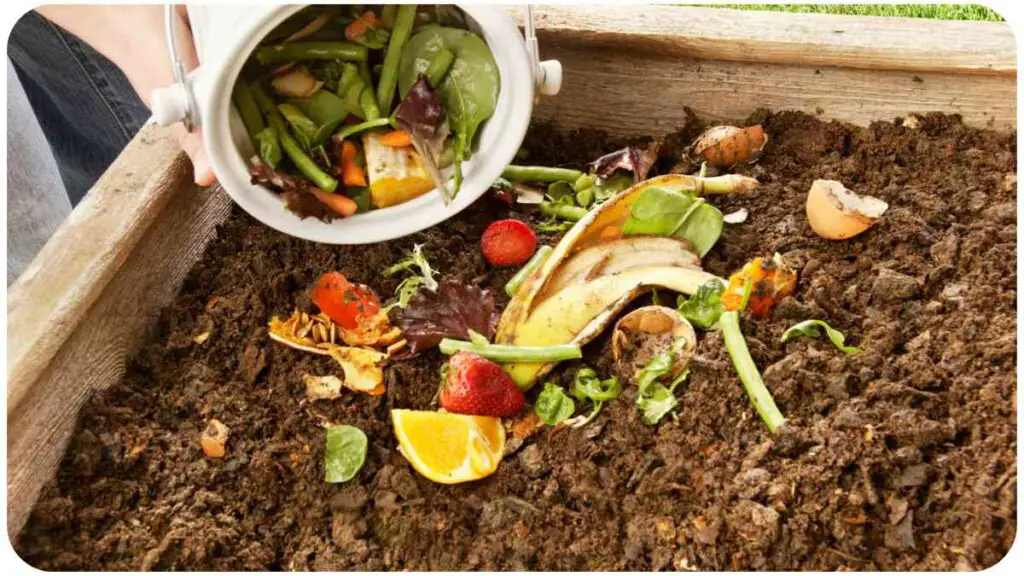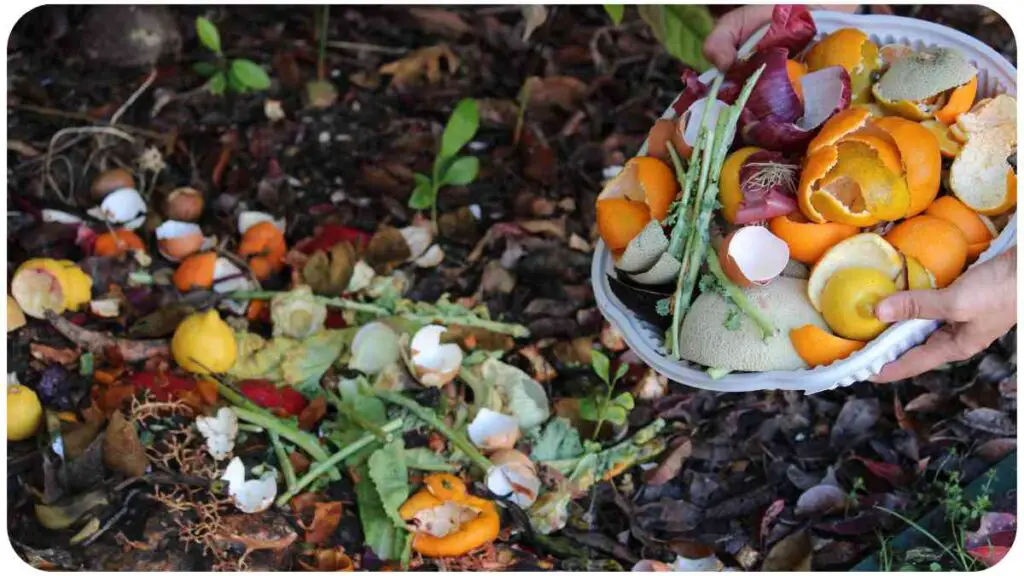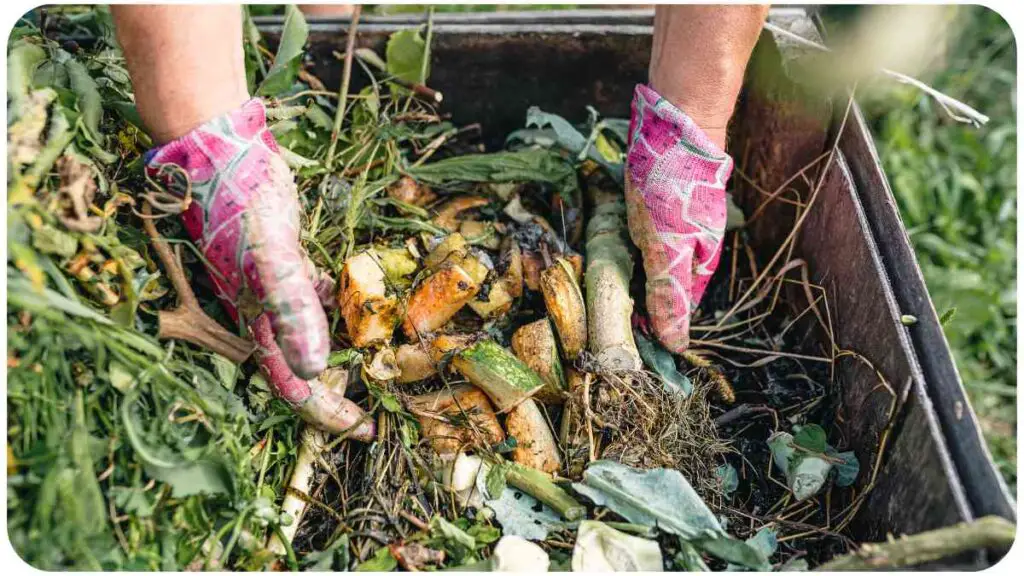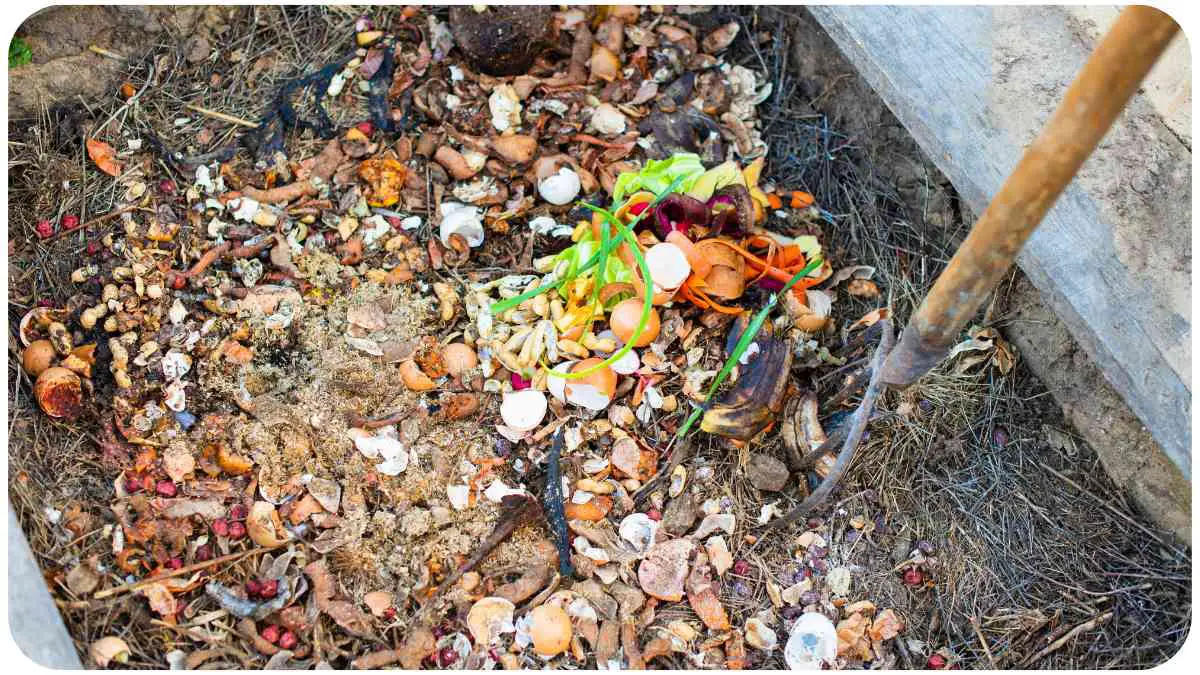Composting is like alchemy for your garden. It takes what seems like waste kitchen scraps, yard clippings, and more and transforms it into nutrient-rich soil that your plants will love. In this guide, we’ll explore the art and science of composting, from getting started to troubleshooting common issues, so you can turn your kitchen scraps into garden gold.
| Takeaways |
|---|
| Composting is an eco-friendly way to recycle kitchen waste. |
| Proper composting can enrich garden soil with essential nutrients. |
| Balancing green and brown materials is key to successful composting. |
| Regular maintenance and monitoring ensure a healthy compost pile. |
| Finished compost can be used to improve soil quality and promote plant growth. |
2. What is Composting?

Composting is a natural process where organic materials decompose into a rich, dark substance called compost. This compost is packed with essential nutrients that plants need to thrive. By harnessing the power of decomposition, you can create a sustainable way to enrich your garden soil.
Composting enriches soil, promotes healthy growth, and reduces waste. Embrace its benefits in your vegetable garden and witness vibrant harvests. Learn more about its advantages in this insightful article.
3. Why Should You Compost?
Composting offers a multitude of benefits, both for your garden and the environment. Not only does it reduce the amount of waste sent to landfills, but it also improves soil structure, retains moisture, and promotes healthy plant growth. Plus, it’s a budget-friendly alternative to store-bought fertilizers.
4. Getting Started with Composting
Materials Needed for Composting
Before you can start composting, you’ll need a few key ingredients:
| Materials | Purpose |
|---|---|
| Kitchen Scraps | Provide nitrogen-rich green materials. |
| Yard Clippings | Add carbon-rich brown materials. |
| Compost Bin | Contains and accelerates the composting process. |
| Shovel or Pitchfork | Turn and aerate the compost pile. |
| Water | Maintain proper moisture levels in the compost pile. |
Compost Bin Options
There are various types of compost bins available, from simple DIY setups to elaborate tumblers. Choose one that fits your space and lifestyle.
Tower and wall gardens offer ingenious solutions for limited spaces. Elevate your gardening game with these space-saving techniques. Discover how to maximize your space with these innovative ideas.
Setting Up Your Compost Bin
Once you have your materials and bin, it’s time to set up your composting system. Find a level spot in your yard with good drainage and start layering your compost ingredients.
5. What Can You Compost?
Not all materials are suitable for composting. Here’s a handy guide to help you decide what to add to your compost pile and what to avoid:
| Compostable | Not Compostable |
|---|---|
| Fruit and Veggie Scraps | Meat and Dairy Products |
| Coffee Grounds | Oily Foods |
| Eggshells | Diseased Plants |
| Yard Waste | Pet Waste |
6. Composting Techniques

Hot Composting
Hot composting is a fast and efficient method that requires regular turning and monitoring of the compost pile. The high temperatures generated during hot composting break down organic materials quickly, resulting in finished compost in as little as a few weeks to a few months.
Cold Composting
Cold composting is a slower process that relies on natural decomposition without the need for regular turning. While it may take longer to produce finished compost, cold composting is low-maintenance and ideal for those who prefer a hands-off approach.
Engage children in the wonders of gardening for a bond with nature. Foster their curiosity through hands-on experiences and create lifelong memories. Explore the joys of gardening with your little ones.
Vermicomposting
Vermicomposting, or worm composting, involves using worms to break down organic matter into nutrient-rich castings. This method is well-suited for indoor or small-space composting and produces high-quality compost while also reducing kitchen waste.
7. Maintaining Your Compost Pile
Turning and Aerating
Regular turning and aerating of the compost pile are essential for ensuring proper decomposition. This helps distribute oxygen and moisture evenly throughout the pile, promoting faster breakdown of materials.
Balancing the Ingredients
Achieving the right balance of green (nitrogen-rich) and brown (carbon-rich) materials is key to successful composting. Aim for a ratio of roughly 3 parts brown to 1 part green to maintain proper decomposition and prevent odors.
Monitoring Moisture Levels
Keeping the compost pile moist but not waterlogged is crucial for microbial activity and decomposition. Check the moisture level regularly by squeezing a handful of compost; it should feel like a damp sponge. Add water as needed to maintain the proper balance.
8. Troubleshooting Common Composting Problems
Composting isn’t always smooth sailing. Here are some common problems you may encounter and how to address them:
| Problem | Solution |
|---|---|
| Smelly Compost Pile | Add more brown materials and ensure proper aeration. |
| Slow Decomposition | Increase the frequency of turning or adjust the carbon-to-nitrogen ratio. |
| Pests in the Compost Pile | Cover the compost pile with a layer of browns or use a lid on the bin. |
| Excessive Moisture | Add more brown materials to absorb excess moisture. |
9. Harvesting and Using Your Compost

Once your compost has matured into dark, crumbly soil-like material, it’s time to harvest and use it in your garden. Here’s how to do it:
- Stop Adding New Materials: Stop adding new materials to the compost pile a few weeks before harvesting to allow the remaining materials to finish decomposing.
- Let it Rest: Let the compost pile rest for a couple of weeks to allow any remaining decomposition to finish and the compost to stabilize.
- Harvest the Compost: Use a shovel or pitchfork to remove the finished compost from the bottom of the pile. Transfer it to a storage container or directly to your garden beds.
- Apply Compost to Your Garden: Spread the compost evenly over your garden beds or mix it into the soil before planting. Compost can also be used as a mulch to retain moisture and suppress weeds.
Combat pests naturally while preserving the health of your garden. Embrace eco-friendly strategies for effective pest control without harming the environment. Discover sustainable solutions in this comprehensive guide.
10. Tips for Successful Composting
- Layer Materials: Alternate layers of green and brown materials to maintain the proper balance of nitrogen and carbon.
- Chop or Shred Large Materials: Break down large materials like branches or cardboard into smaller pieces to speed up decomposition.
- Monitor Temperature: Check the temperature of the compost pile regularly, especially during hot composting, to ensure it’s within the optimal range for decomposition.
- Avoid Adding Diseased Plants: Avoid adding plants infected with diseases or pests to the compost pile to prevent spreading pathogens.
- Turn Regularly: Turn the compost pile regularly to aerate it and promote even decomposition.
- Patience is Key: Composting takes time, so be patient and trust the process. With time and proper care, you’ll be rewarded with nutrient-rich compost for your garden.
Conserve water and thrive in dry conditions with smart planting methods. Overcome drought challenges by implementing water-wise gardening techniques. Dive into the world of drought-busting gardens with these expert tips.
11. Conclusion
Composting is a simple yet powerful way to reduce waste, improve soil health, and nourish your garden naturally. By following the tips and techniques outlined in this guide, you can harness the magic of composting to transform kitchen scraps into garden gold. Start composting today and reap the rewards of a thriving garden tomorrow!
Further Reading
- Composting 101: Turning Waste into Garden Gold: This comprehensive guide offers step-by-step instructions on how to start composting and turn your kitchen waste into nutrient-rich soil for your garden.
- How to Turn Food Waste into Garden Gold: Learn how to effectively compost food waste and other organic materials to create valuable compost for your garden with tips and tricks from this informative article.
- The Magic of Composting: Turning Kitchen Scraps into Garden Gold: Discover the wonders of composting and how it can transform your kitchen scraps into garden gold with insights and techniques shared in this engaging read.
FAQs
What materials can I compost?
You can compost a variety of materials, including fruit and vegetable scraps, coffee grounds, eggshells, yard clippings, and more. Avoid composting meat, dairy, and oily foods.
How long does it take for compost to be ready?
The time it takes for compost to be ready depends on various factors such as composting method, environmental conditions, and the types of materials used. Generally, it can take anywhere from a few weeks to several months.
Do I need a compost bin to compost?
While a compost bin can help contain the materials and accelerate the composting process, it’s not strictly necessary. Composting can also be done in a simple pile or using other containers.
How do I prevent odors in my compost pile?
To prevent odors in your compost pile, make sure to maintain the proper balance of green and brown materials, avoid adding meat or dairy products, and regularly turn and aerate the pile to promote decomposition.
Can I compost in an apartment or small space?
Yes, you can compost in an apartment or small space using methods such as vermicomposting or small-scale composting bins. These methods are space-efficient and suitable for indoor composting.

For 15 years, Hellen James has worked in the gardening industry as an expert and landscape designer. During her career, she has worked for a variety of businesses that specialize in landscaping and gardening from small firms to large corporations.

